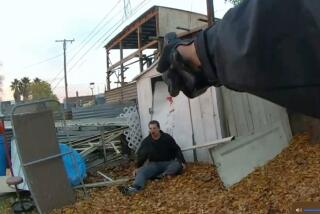Levity Cuts Hearing’s Hostile Air
- Share via
By and large, the court hearing that will resume Tuesday for David A. Brown, accused of murdering his wife, has been an intensely bitter and heated affair.
The warring attorneys sniped at one another endlessly over the course of four days of testimony, beginning late last month. Vicious accusations flew wildly. Brown’s 18-year-old daughter, who was convicted of murdering her stepfather but now claims she was set up by her own father, cowered on the witness stand under Brown’s sharp gaze.
And even the judge acknowledged that the hostile, emotionally charged atmosphere threatened to become more like “a three-ring circus” than a hall of justice.
Yet even in that tense atmosphere of antagonism, there emerged a few moments of levity so spontaneous that even the feuding lawyers, the man accused of murder and his embittered daughter all had to laugh.
The week’s proceedings in Westminster Municipal Court were filled with a stream of objections by both defense attorney Joel Baruch and prosecutor Jeoffrey Robinson as each complained bitterly about the other’s legal tactics. And rarely did either miss a chance to tinge a legal objection with a personal jibe at opposing counsel.
But on the second day of a hearing to determine whether Brown should stand trial for murder, defense attorney Baruch sought to strike a rare, conciliatory tone.
As he began to make his point to the court, Baruch said: “Now I know Mr. Robinson is a very good lawyer, but . . . “
He was cut off abruptly as prosecutor Robinson rose from his seat with a wry smile on his face. “Objection!” Robinson said. “Assumes a fact not in evidence!”
Defense attorney Baruch was trying, with some frustration, to shake Cinnamon Brown loose from the story that she had been telling on the witness stand for the last 3 days.
Brown claims that she killed her stepmother only after her father’s persuasive prodding and, wanting to protect her father, had remained silent about the plot for more than 3 years while in a California Youth Authority facility.
Baruch didn’t buy the explanation. He disclosed in court that Cinnamon Brown has a boyfriend, a young man whom she met in the CYA facility in Camarillo but who has since been freed.
And through sharp questioning, Baruch tried to show that the young woman changed her story about the killing not out of any concern for the truth but because she wanted to get out of prison and be with her boyfriend.
Wasn’t Cinnamon Brown jealous because the boyfriend is on the outside and able to date other women--and perhaps leave her for someone else? Baruch asked pointedly.
Brown, stone-faced and pained throughout most of her testimony, flashed a brief smile as she shook her head.
No, she wasn’t jealous, she answered quickly. “It doesn’t really concern me because no one else wants him.”
The courtroom broke into laughter. Baruch, a bit flustered, soon moved on to another subject.
Cinnamon Brown was offering most of the admissions as she talked on the witness stand about the killing of her stepmother, but prosecutor Robinson had a confession or two of his own.
On the second day of Cinnamon Brown’s testimony, defense attorney Baruch was trying yet another tack in an effort to damage the credibility of the prosecution’s star witness.
The defense attorney wanted to throw doubt on Cinnamon Brown’s mental stability by introducing evidence that the teen-ager had invented and often conversed with a pair of imaginary playmates--Oscar and Maynard.
Robinson, objecting to the use of such testimony as irrelevant, told the court he didn’t find anything strange about the woman’s playmates.
A bit embarrassed, he admitted that when he was younger “I had imaginary friends, and, frankly, right now I still have one.”
There were chuckles from the judge, the court audience and even Baruch--though many in the courtroom didn’t seem quite sure whether to take the prosecutor’s remark seriously.
And the judge? He agreed with the prosecutor’s argument and blocked Baruch from bringing any imaginary friends into the case.
The laughs will probably be fewer and further between when David A. Brown’s preliminary hearing resumes.
Judge Floyd H. Schenk has scheduled a hearing on Baruch’s motion to have Robinson dismissed from prosecuting the case because of his conduct. The defense attorney--who himself was cited by Schenk for contempt of court--is complaining that the prosecutor has been trying to harass and intimidate him.
Testimony then will resume, with Patricia Bailey--the dead woman’s sister, David Brown’s alleged accomplice and now his wife--takes the witness stand.
More to Read
Sign up for Essential California
The most important California stories and recommendations in your inbox every morning.
You may occasionally receive promotional content from the Los Angeles Times.













